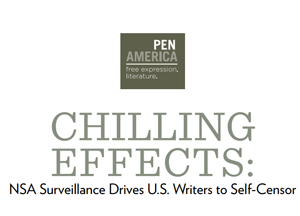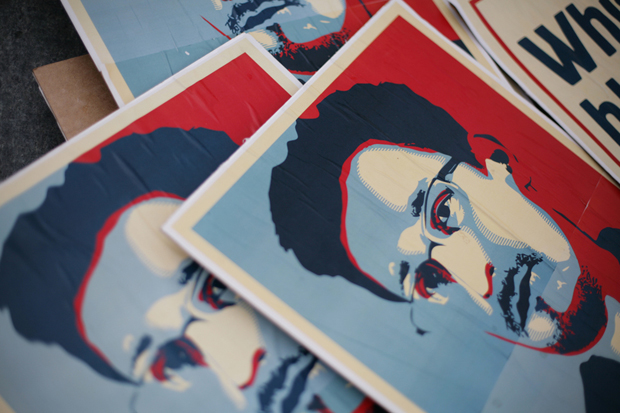17 Jan 2014 | About Index, Campaigns, Statements
Leading free speech and privacy organisations call on the world’s elite assembled at Davos to tackle the challenge of global mass surveillance of electronic communications.
ARTICLE 19, English PEN, Index on Censorship and Open Rights Group are urging global leaders to discuss how states ensure security measures do not undermine rights and individual liberties, following revelations that the security agencies have been conducting secret mass surveillance of the digital communications of millions of people around the world.
The organisations said:
“The mass surveillance of our communications by the NSA, GCHQ and others undermines the right to privacy, free speech and media freedom. As such it is an assault on democracies and our societies. The leaders assembled at Davos must take a stand against surveillance – stop spying on us now.”
Secret mass surveillance is a threat to democracy and the rule of law.
If people are unable to know about the extent of government surveillance, we are unable to protect our fundamental rights.
When private communications are monitored by the state in secret, confidence in digital communications technology is unacceptably compromised, which has a severe chilling effect on freedom of expression and dangerously risks restricting the free flow of information.
Online surveillance programmes threaten to weaken the general security and privacy of communications systems and undermines trust in digital services. This has economic implications, as well as compromising the ability of people to express themselves.
We believe that:
Surveillance is only legitimate when it is targeted, authorised by a warrant, and when it is necessary and proportionate.
Mass population-wide surveillance is never justified.
Secret agreements that sanction mass surveillance undermine democracy. Citizens need a clear legal framework that governs state surveillance, in order to protect their rights.
All surveillance should be sanctioned by an independent judge on a case-by-case basis.
There must be effective, independent oversight of surveillance to command public confidence that such surveillance is not being abused.
For further information or interviews please contact:
Jo Glanville, Director, English PEN – tel 0771 302 0971
Kirsty Hughes, CEO, Index on Censorship – tel 07577 483 815
Jim Killock, Executive Director, Open Rights Group – tel 0789 449 8127
ARTICLE 19 – tel 0207 324 2510
Liberty
11 Nov 2013 | News and features, United States

Sixty-six percent of American writers disapprove of their government’s collection of phone and internet data, according to a survey from the PEN American Center.
The survey of 540 US writers found that a majority assume that their communications are monitored. PEN says that this assumption has prompted some to self-censor when writing or researching certain subjects or communicating with sources, or friends, abriad.
“I assume everything I do electronically is subject to monitoring,” one writer said in responding to the survey.
The report states:
This assumption is striking: in a short span of time, the United States has shifted from a society in which the right to privacy in personal communications was considered inviolate to a society in which many writers assume they have already lost the right to privacy and now expect to be spied upon almost constantly.”
Survey respondents were concerned about the US framework for surveillance would become “business as usual” for the rest of the world.
Writers reported self-censoring on subjects including military affairs, the Middle East North Africa region, mass incarceration, drug policies, pornography, the Occupy movement, the study of certain languages and criticism of the US government.”
Read the full report here
8 Nov 2013 | Digital Freedom, News and features, United Kingdom

(Photo: David von Blohn / Demotix)
This week saw some movement in the debate over NSA and GCHQ surveillance, and a court case that could have very serious consequences.
The court case first. One Wednesday and Thursday, the court of Appeal held a judicial review into the use of Schedule 7 of the Terrorism Act taken by David Miranda, partner of journalist Glenn Greenwald. Miranda was detained in transit at Heathrow airport under Schedule 7 while carrying encrypted documents that had emanated, ultimately, from whistleblower Edward Snowden.
The question was whether the authorities, knowing who Miranda was, what he was likely to be carrying, and his purpose for holding the documents, had a right to detain him under that particular piece of law.
It’s quite technical, but it comes down to whether carrying the documents Miranda was carrying could be seen as an act of terrorism or an act that could potentially aid terrorism (as the government and police argue) or as part of a journalistic enterprise (in essence, what Miranda is arguing).
Index and other organisations have weighed in in support of the argument put forward by Miranda’s team, as we worry that a ruling against Miranda could have serious implications. Journalism can often operate in dubious areas: whether material “leaked” or “stolen” for example, is a question that can have very different answers depending on who you ask.
In this case, the UK government very clearly maintains that the documents have been stolen and should be given back. Furthermore, they believe that they could fall into the hands of the wrong people – terrorists or hostile states, if not in the control of security services.
That, by the way, was very interesting indeed. The Home Office’s case suggested Russia, where Edward Snowden has been granted temporary asylum, is a hostile state.
The other side of this argument is that Miranda was assisting in journalism. This will involve, on occasion, having documents others would rather you did not have. The act of journalism is to sift these documents and decide where the stories lie within them. There was considerable back and forth on what “responsible journalism” constitutes during the hearing, but ultimately, it must be up to an editor what goes into a paper.
The Guardian’s Alan Rusbridger maintains he has acted with absolute responsibility. And GCHQ have as yet not claimed that agents have been endangered as a result of the Guardian’s revelations.
But at a hearing of parliament’s Intelligence and Security Committee (the ISC) on Thursday, spy chiefs insisted that Britain’s enemies were “rubbing their hands with glee” at the Guardian’s publications, and that terrorist chatter online had “gone dark” (i.e. more difficult to trace) since the first stories had appeared.
What next for the surveillance debate? The ISC performance was generally held to be weak. Rory Stewart MP has suggested it be composed more democratically, with an opposition MP at its head. The general demand on surveillance seems fairly low key: more scrutiny, less scope for random snooping.
Meanwhile the judges will mull over the Miranda case, and, we hope, come to the conclusion that whatever the young Brazilian was doing, it wasn’t terrorism.
This article was originally posted on 8 Nov 2013 at indexoncensorship.org
30 Oct 2013 | Events

Confirmed speakers:
Alan Rusbridger
in conversation with William Sieghart
David Davis MP
Sir Simon Jenkins
Jo Glanville
Tom Watson MP
RIBA
66 Portland PAce
London W1B 1AD
Monday, 4 November 2 0 1 3
6.4 5 – 9.0 0 P M
RSVP: [email protected]
Revelations about mass surveillance operations by the NSA and GCHQ have caused outrage in Europe, South America and the United States. There have been demonstrations and angry interventions by heads of state, and even President Obama concedes that a debate needs to happen. But in Britain protest and discussion are very close to being silenced.
The Guardian newspaper, which led the New York Times, the Washington Post and Der Spiegel in publishing material from the NSA leaks, is almost alone in believing that mass civilian surveillance is a matter of vital public interest. And now the British government, Parliament’s Intelligence and Security Committee, the intelligence agencies and even some sections of the media seek to isolate the Guardian and shut down the debate with claims that these disclosures aid terrorists and put national security at risk.
This must not be allowed to happen. This independently organised meeting at RIBA, on November 4, is called to support the Guardian’s reporting and to assert the right to a full national debate, involving all parties, about surveillance powers and the need to ensure
that the intelligence services work within the rule of law and are subject to genuine Parliamentary scrutiny and oversight. That is the only way for a democracy to react to revelations that affect everyone’s liberty.
Supporters include: Timothy Garton Ash (Oxford University and author of The File), Anthony Barnett (Cofounder Charter 88 and openDemocracy), Rory Bremner (Writer and performer), John le Carré (Author), David Davis (Conservative MP), Brian Eno (Musician and producer), Stephen Frears (Director), Alex Graham (Founder and CEO, Wall to Wall TV), Baroness Helena Kennedy QC (Lawyer and Principal of Mansfield College, Oxford), Peter Kosminsky (TV director and governor of BFI), Simon McBurney (Founder and artistic director, Theatre Complicite), Suzanne Moore (Columnist), Lord Pannick QC (Leading public law and human rights lawyer), Dr Elaine Potter (David and Elaine Potter Foundation), Philip Pullman (Writer), Richard Rogers (Architect), Ruthie Rogers (Chef), Philippe Sands QC (Leading human rights lawyer), Juliet Stevenson (Actor, writer and director), Neil Tennant (Singer-songwriter), Jimmy Wales (Founder, Wikipedia) and Sam West (Actor).
Also supported by the following organisations: Index on Censorship, Big Brother Watch, Human Rights Watch, openDemocracy, Open Rights Group, English PEN, The Manifesto Club, and Reprieve



